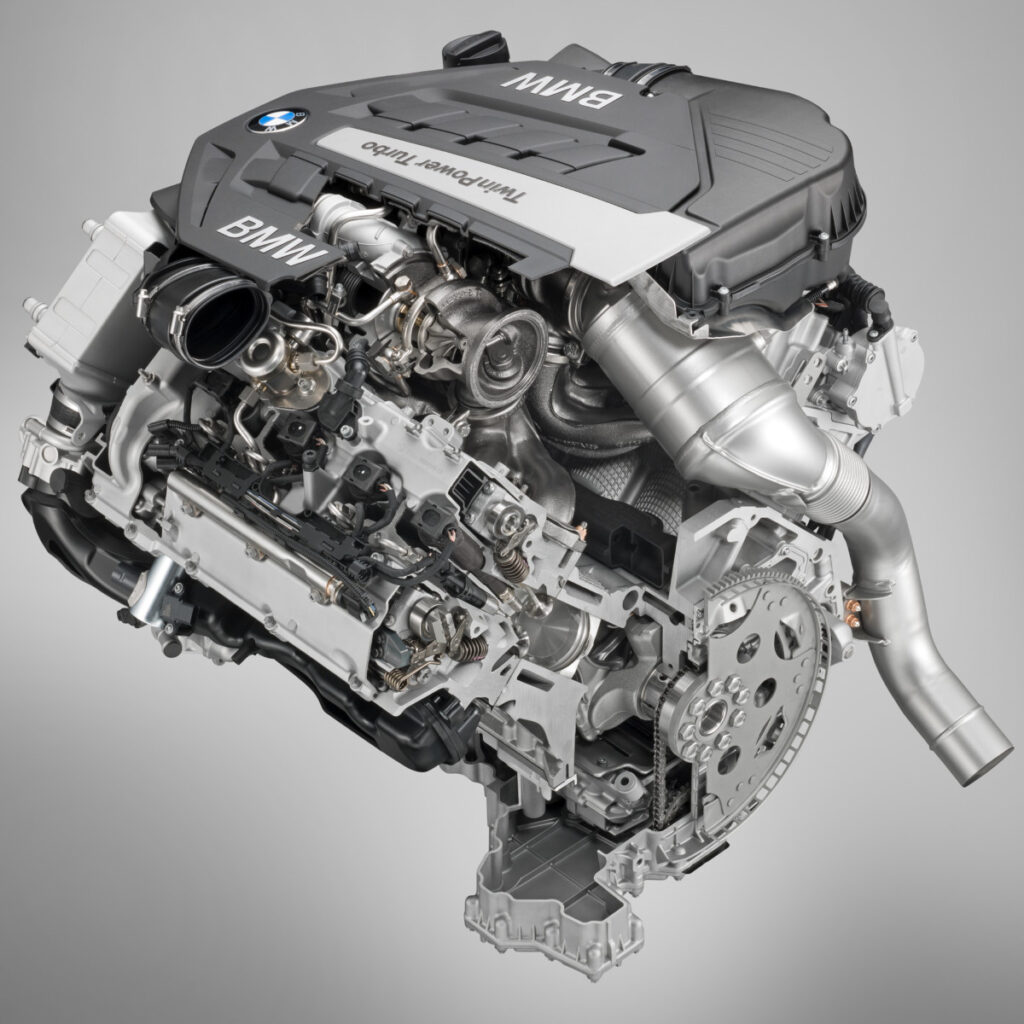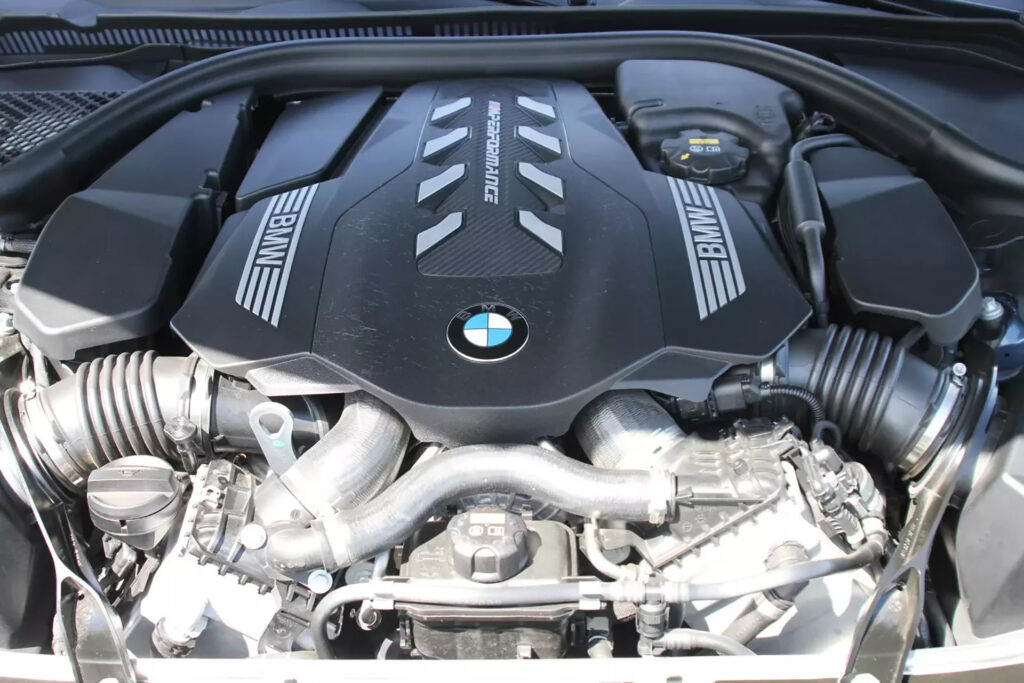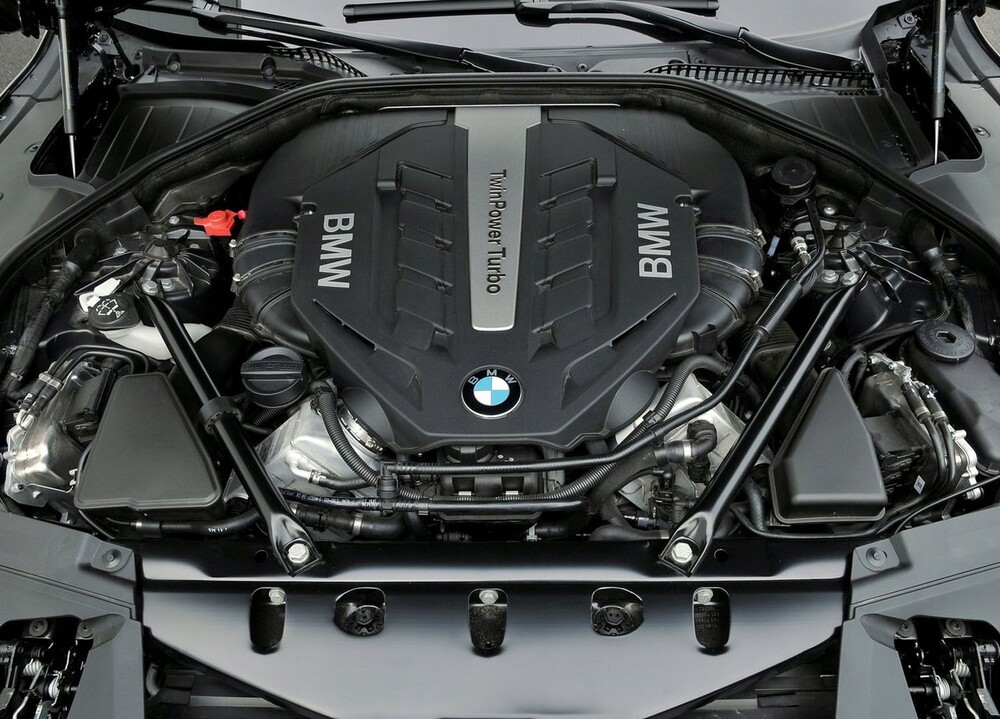The BMW N63 series of 8-cylinder engines with a displacement of 4.0 and 4.4 liters has been produced since 2008 and is installed in almost all current large models of the German automobile concern. There is a number of sport versions of this engine under the index S63 with power up to 600 hp.
BMW N63 Specifications
Modification: N63B40A
| Displacement | 3982 cc |
| Power system | Direct Injection |
| Engine power | 408 – 449 hp |
| Torque | 600 – 650 Nm |
| Cylinder block | Aluminum V8 |
| Cylinder head | Aluminum 32v |
| Cylinder diameter | 89 mm |
| Stroke | 80 mm |
| Compression ratio | 10 |
| Engine features | Valvetronic III |
| Hydraulic compensators | Yes |
| Timing Chain/Belt | Chain |
| Variable Valve Timing (VVT) | dual-VANOS |
| Turbocharger | Yes |
| Oil capacity/Recommended oil | 8.5 l 5W-30 |
| Fuel type | Premium, Supreme |
| Euro class | EURO 5 |
| Average lifespan | 250 000 km |
Modification: N63B44O0, N63B44
| Displacement | 4395 cc |
| Power system | Direct Injection |
| Engine power | 408 hp |
| Torque | 600 Nm |
| Cylinder block | Aluminum V8 |
| Cylinder head | Aluminum 32v |
| Cylinder diameter | 89 mm |
| Stroke | 88.3 mm |
| Compression ratio | 10 |
| Engine features | No |
| Hydraulic compensators | Yes |
| Timing Chain/Belt | Timing Chain |
| Variable Valve Timing (VVT) | dual-VANOS |
| Turbocharger | Yes |
| Oil capacity/Recommended oil | 8.5 l 5W-30 |
| Fuel type | Premium, Supreme |
| Euro class | EURO 4/5 |
| Average lifespan | 250 000 km |
Modification: N63B44O1, N63TU
| Displacement | 4395 cc |
| Power system | TVDI |
| Engine power | 450 hp |
| Torque | 650 Nm |
| Cylinder block | Aluminum V8 |
| Cylinder head | Aluminum 32v |
| Cylinder diameter | 89 mm |
| Stroke | 88.3 mm |
| Compression ratio | 10 |
| Engine features | Valvetronic III |
| Hydraulic compensators | Yes |
| Timing Chain/Belt | Chain |
| Variable Valve Timing (VVT) | dual-VANOS |
| Turbocharger | Yes |
| Oil capacity/Recommended oil | 8.5 l 5W-30 |
| Fuel type | Premium, Supreme |
| Euro class | EURO 5 |
| Average lifespan | 225 000 km |
Modification: N63B44O2, N63TU2
| Displacement | 4395 cc |
| Power system | TVDI |
| Engine power | 450 hp |
| Torque | 650 Nm |
| Cylinder block | Aluminum V8 |
| Cylinder head | Aluminum 32v |
| Cylinder diameter | 89 mm |
| Stroke | 88.3 mm |
| Compression ratio | 10 |
| Engine features | Valvetronic III |
| Hydraulic compensators | Yes |
| Timing Chain/Belt | Timing Chain |
| Variable Valve Timing (VVT) | dual-VANOS |
| Turbocharger | twin-scroll |
| Oil capacity/Recommended oil | 8.5 l 5W-30 |
| Fuel type | Premium, Supreme |
| Euro class | EURO 5 |
| Average lifespan | 220 000 km |
Modification: N63B44M3, N63TU3
| Displacement | 4395 cc |
| Power system | TVDI |
| Engine power | 462 hp |
| Torque | 650 Nm |
| Cylinder block | Aluminum V8 |
| Cylinder head | Aluminum 32v |
| Cylinder diameter | 89 mm |
| Stroke | 88.3 mm |
| Compression ratio | 10 |
| Engine features | Valvetronic III |
| Hydraulic compensators | Yes |
| Timing Chain/Belt | Chain |
| Variable Valve Timing (VVT) | dual-VANOS |
| Turbocharger | twin-scroll |
| Oil capacity/Recommended oil | 8.5 l 5W-30 |
| Fuel type | Premium, Supreme |
| Euro class | EURO 5/6 |
| Average lifespan | 200 000 km |
Modification: N63B44T3, N63TU3
| Displacement | 4395 cc |
| Power system | TVDI |
| Engine power | 530 hp |
| Torque | 750 Nm |
| Cylinder block | Aluminum V8 |
| Cylinder head | Aluminum 32v |
| Cylinder diameter | 89 mm |
| Stroke | 88.3 mm |
| Compression ratio | 10 |
| Engine features | Valvetronic III |
| Hydraulic compensators | Yes |
| Timing Chain/Belt | Timing Chain |
| Variable Valve Timing (VVT) | dual-VANOS |
| Turbocharger | twin-scroll |
| Oil capacity/Recommended oil | 8.5 l 5W-30 |
| Fuel type | Premium, Supreme |
| Euro class | EURO 5/6 |
| Average lifespan | 190 000 km |
The catalog weight of the N63 motor is 230 kg
The N63 engine number is located on the joint between the block and the pallet

Oil specs
The BMW N63 engine has varying oil specifications depending on the specific model and year. However, here are some general guidelines:
Oil Capacity: The oil capacity for the N63 engine is around 7-8 quarts (6.6-7.5 liters) depending on the model.
Oil Type: BMW recommends using synthetic motor oil that meets the BMW Longlife-01 specification. Some popular options include Castrol EDGE Professional LL01, Mobil 1 0W-40, and Pennzoil Platinum Euro SAE 5W-30.
Oil Change Intervals: The oil change intervals for the N63 engine are typically around 10,000 miles (16,000 km) or once a year, whichever comes first. However, it’s important to consult your owner’s manual for the specific recommended oil change intervals for your particular vehicle.
Fuel consumption of the BMW N63
The BMW 750i 2013 model with automatic transmission as an example:
| City | 13.0 l |
| Highway | 7.2 l |
| Combined | 9.3 l |
Which cars use the N63 4.0 – 4.4 l
| 5-Series F07 | 2009 – 2017 |
| 5-Series F10 | 2010 – 2017 |
| 5-Series G30 | 2017 – … |
| 6-Series F06 | 2012 – 2018 |
| 6-Series F12 | 2011 – 2018 |
| 7-Series F01 | 2008 – 2015 |
| 7-Series G11 | 2015 – … |
| 8-Series G15 | 2018 – … |
| X5-Series E70 | 2010 – 2013 |
| X6-Series E71 | 2008 – 2014 |
| X5-Series F15 | 2013 – 2018 |
| X6-Series F16 | 2014 – 2019 |
| X5-Series G05 | 2018 – … |
| X7-Series G07 | 2018 – … |

The maintenance intervals and estimated costs for the BMW N63
| Maintenance Item | Interval | Estimated Cost Range |
|---|---|---|
| Oil and filter change | 10,000 miles or once a year | $100 – $300 |
| Spark plug replacement | 45,000 miles | $300 – $500 |
| Air filter replacement | 30,000 miles | $50 – $100 |
| Fuel filter replacement | 60,000 miles | $100 – $200 |
| Engine coolant flush and refill | 60,000 miles or every 5 years | $150 – $300 |
| Brake fluid flush and refill | 30,000 miles or every 2 years | $100 – $200 |
| Automatic transmission service | 60,000 miles | $400 – $800 |
| Differential oil change | 60,000 miles | $200 – $400 |
| Transfer case oil change | 60,000 miles | $150 – $300 |
| Power steering fluid flush | 60,000 miles | $100 – $200 |
| Engine air duct cleaning | 60,000 miles | $50 – $100 |
| Throttle body cleaning | 60,000 miles | $100 – $200 |
| Coolant temperature sensor check | 60,000 miles | $50 – $100 |
| Battery replacement | 4-6 years depending on usage | $150 – $300 (parts+labor) |
| Ignition coil replacement | 60,000 miles or as needed | $300 – $500 (parts+labor) |
Note that the costs listed here are estimated and may vary depending on various factors such as location, dealership versus independent mechanic, and parts and labor costs. It’s always recommended to consult your owner’s manual or a trusted mechanic for specific maintenance recommendations and costs.
Common Problems with BMW N63 Engine
These are the most commonly reported problems that are associated with this engine. We will discuss each of these issues in detail in the following sections.
Timing Chain Failure
The timing chain failure is one of the most severe problems that can occur with the N63 engine. Although BMW uses timing chains in place of timing belts, contrary to popular belief, these chains don’t last forever. After reaching 100,000 miles, the timing chain may begin to rattle, and if left unaddressed, can lead to the engine skipping timing, which can result in the engine failing altogether. Therefore, it’s crucial to replace the timing chain as soon as you start noticing any unusual rattling sounds.
Fuel Injector Failure
Fuel injector failure is another common issue that can arise with this engine. It occurs when the injector body starts leaking internally, leading to misfires and a check engine light. If you encounter this problem, it’s best to replace the faulty injector with a new one. It’s also recommended to check all injectors and replace them if necessary, as a pack of eight injectors can cost up to $1,800.
Carbon Buildup
Direct injection in the N63 engine makes carbon buildup on the intake and exhaust valves very common. This can cause the valves to not open and close correctly, leading to misfires and poor engine performance. Therefore, a walnut blasting process is necessary every 60,000 miles to remove the carbon buildup.
Oil Consumption
The N63 engine is known to consume a lot of oil, particularly in models manufactured between 2013 and 2019. If you’re in the market for this engine, it’s recommended to opt for a model that is newer than 2019 to avoid this issue.
Leaky Valve Stem Seals
Valve stem seals prevent oil from entering the combustion chamber, but in many BMW engines, including the N63, these seals can fail, leading to oil consumption. If the problem is severe, the engine can lose a significant amount of oil, and black smoke may emit from the exhaust.
Battery Drainage
Battery drainage is a common issue with models that use the N63 engine. This can result in frequent battery replacements, which can be expensive for BMW owners.
HPFP Pump Failure
The high-pressure fuel pump (HPFP) is responsible for pushing fuel into the injectors. Unfortunately, these pumps are known for failing in BMW engines, and replacing them can be expensive.
MAF Sensor Failure
The MAF sensor monitors the amount of air that enters the engine and adjusts the air-to-fuel ratio accordingly. However, on numerous occasions, the sensor can fail, causing issues with the engine’s performance. Replacing the unit is the only way to resolve this problem.

BMW N63 price
Estimated price table for the BMW N63 engine. Please note that the prices can vary depending on the location, condition, and availability.
| Type of Engine | Price Range | Description |
|---|---|---|
| New Engine | $10,000 – $15,000 | Brand new engine with full warranty from BMW |
| Used Engine | $3,000 – $8,000 | Pre-owned engine in working condition |
| Remanufactured Engine | $6,000 – $9,000 | Rebuilt engine by a third-party with a warranty |
| Cost of Replacement | $5,000 – $15,000 | Cost to replace the engine, including labor costs |
Please keep in mind that these prices are estimates and are subject to change based on the specific engine and location. Additionally, the cost of replacement may vary depending on the extent of damage and the amount of labor required for the installation. It is recommended to consult with a certified mechanic or BMW dealership for accurate pricing and information.
0 Comments